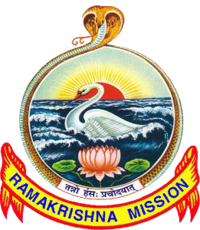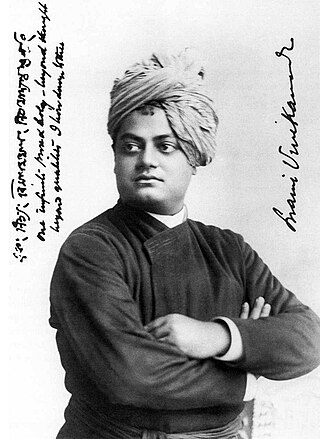
Swami Vivekananda, born Narendranath Datta was an Indian Hindu monk, philosopher, author, religious teacher, and the chief disciple of the Indian mystic Ramakrishna. He was a key figure in the introduction of Vedanta and Yoga to the Western world. He is credited with raising interfaith awareness and bringing Hinduism to the status of a major world religion in the late nineteenth century.

Ramakrishna Math and Ramakrishna Mission (RKM) is a spiritual and philanthropic organisation headquartered in Belur Math, West Bengal. The mission is named after the Indian Hindu spiritual guru and mystic Ramakrishna. The mission was founded by Ramakrishna's chief disciple Swami Vivekananda on 1 May 1897. The organisation mainly propagates the Hindu philosophy of Vedanta–Advaita Vedanta and four yogic ideals – Jnana, Bhakti, Karma, and Raja yoga. The mission bases its work on the principles of Karma Yoga, the principle of selfless work done with a dedication to God.

Ramakrishna Mission Vivekananda College, named after Swami Vivekananda, was formally inaugurated on 21 June 1946 by professor, philosopher, and politician, Sarvepalli Radhakrishnan. It is in Mylapore, the centre of Chennai, India, on 20 acres. This college is part of various educational institutions owned by Ramakrishna Mission.
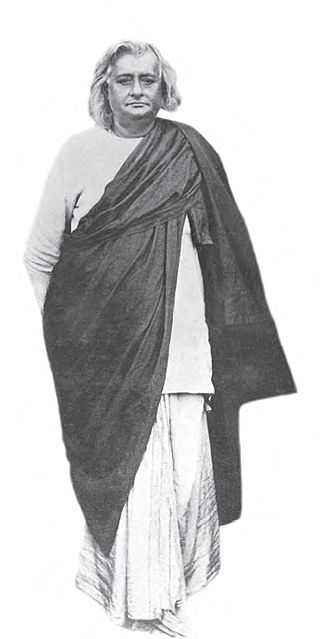
Swami Akhandananda (1864–1937) was a swami and direct disciple of Sri Ramakrishna, a 19th-century mystic. He was the third president of the Ramakrishna Mission.
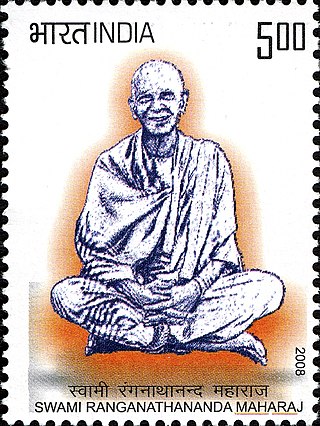
Swami Ranganathananda was a Hindu swami of the Ramakrishna Math order. He served as the 13th president of the Ramakrishna Math and Ramakrishna Mission.

Shuddhananda who was the fifth president of the Ramakrishna Order, was a direct monastic disciple of Vivekananda. He joined the Ramakrishna Math in 1897. He became a trustee of Ramakrishna Math and a member of the governing body of Ramakrishna Mission in May 1903. He also took up the editorship of the Bengali magazine called Udbodhan for sometime. He was appointed as the secretary of the math and the mission in 1927 and as the vice president in 1937. In 1938, he became the president of the order. His tenure was short, as he died in 1938. He is renowned in the literary circles to have translated most of Vivekananda's original works from English to Bengali.

Swami Virajananda, born Kalikrishna Bose, was an initiated disciple of Sarada Devi and the sixth president of the Ramakrishna Order. Born as the son of Trailokyanath Bose and Nishadkalidevi, Virajananda was the first person to join the Ramakrishna Order after the direct disciples of Ramakrishna. In 1897, he was initiated into sannyasa by Vivekananda. From 1899 onward he served in Advaita Ashrama, Mayavati and became its president in 1906. He is recognised as a monastic disciple of Vivekananda.

Belur Math is the headquarters of the Ramakrishna Math and Ramakrishna Mission, founded by Swami Vivekananda, the chief disciple of Ramakrishna Paramahamsa. It is located in Belur, West Bengal, India on the west bank of Hooghly River. Belur Math was established in January 1897, by Swami Vivekananda who was the disciple of Sri Ramakrishna. Swami Vivekananda returned back to India from Colombo with a small group of disciples and started work on the two one at Belur, and the others at Mayavati, Almora, Himalayas called the Advaita Ashrama. The temple is the heart of the Ramakrishna movement. It is notable for its architecture that fuses Hindu, Islamic, Buddhist, and Christian art and motifs as a symbol of unity of all religions. In 2003, Belur Math railway station was also inaugurated which is dedicated to Belur Math Temple.

Sister Nivedita was an Irish teacher, author, social activist, school founder and disciple of Swami Vivekananda. She spent her childhood and early youth in Ireland. She was engaged to marry a Welsh youth, but he died soon after their engagement.
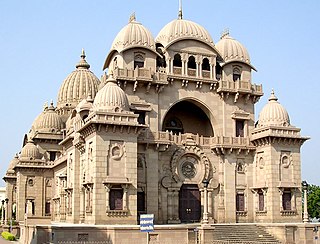
Ramakrishna Math is the administrative legal organization of the Ramakrishna Order, of Daśanāmi Sampradaya. It was set up by sanyasin disciples of Ramakrishna Paramhansa headed by Swami Vivekananda at Baranagar Math in Baranagar, a place near Calcutta, in 1886. India. The headquarters of Ramakrishna Math and its twin organisation, Ramakrishna Mission is at Belur Math.

P. Parameswaran, often referred to as Parameswarji, was a Rashtriya Swayamsevak Sangh (RSS) pracharak from Kerala, India who was erstwhile Vice‑President of the Jan Sangh.
Swamiji is a 2012 laser show and documentary film directed and produced by Manick Sorcar. Based on the life story of Hindu monk Swami Vivekananda (1863–1902), it is the first laser documentary made on an individual and the first full-length laser documentary ever to be shown in a performing arts center.

Ramakrishna Paramhansa Deva had sixteen direct disciples who became monks of the Ramakrishna Order; they are often considered his apostles. In the Ramakrishna-Vivekananda movement, the apostles have played an important role. Apart from Swami Vivekananda, the direct disciples or apostles of Ramakrishna were as follows.

Prabuddha Bharata is an English-language monthly journal of the Ramakrishna Order, in publication since July 1896. It carries articles and translations by monks, scholars, and other writers on humanities and social sciences including religious, psychological, historical, and cultural themes. It has a section of book reviews where important publications from university presses from around the world are reviewed. It is edited from Advaita Ashrama, Mayavati, Uttarakhand, and published and printed in Kolkata. Prabuddha Bharata is India's longest running English journal.

Udbodhan is the only Bengali publication of the Ramakrishna Math and Ramakrishna Mission, started by Vivekananda in January 1899, with Trigunatitananda as its founding editor Over the years, it also grew into a publishing house, and remained one of the leading publishers of literature of Ramakrishna and Vivekananda.

Sister Christine or Christina Greenstidel was a school teacher, and close friend and disciple of Swami Vivekananda. On 24 February 1894, Christine attended a lecture of Vivekananda in Detroit, United States which inspired her. She started communicating with Vivekananda through letters. Christine went to India in 1902 and began working as a school teacher and a social worker.
Sankari Prasad Basu was an Indian scholar, writer and critic who writes mainly in the Bengali language. He is a researcher on Swami Vivekananda and his books on the subject include Sahashya Vivekananda and Bandhu Vivekananda. One of his notable publications is his seven-volume research work Vivekananda o Samakalin Bharatbarsha, for which he won the prestigious Sahitya Akademi Award in 1978.

Ramakrishna Mission Sevashrama, Kankhal (RKMS) is in its present form is a 190-bed multi-specialty charitable hospital in Kankhal, Haridwar in Uttarakhand. It is a branch of Ramakrishna Mission, and was established in 1901 by Swami Kalyanananda, one of the direct monastic disciples of Swami Vivekananda. The hospital serves the treatment needs of poor patients in and around Uttarakhand. Since its inception it has treated more than 10 million patients. From a modest beginning in a rented two room dilapidated building it has grown to be a multi-specialty hospital for treatment of impoverished and needy people, under the supervision of the monks of Ramakrishna Order. The hospital is located in an 18 acres campus, and houses Gynecology and Obstetrics, Pediatrics, Intensive Care Units, Pathological laboratory, Blood bank, Operation Theaters etc. in addition to dairy and agricultural land whose products are used for the consumption of poor in patients.

Balaram Mandir is a temple and a branch of Ramakrishna Mission and Ramakrishna Math located at 7, Girish Avenue, Baghbazar, Kolkata.
